HI5015 Legal Aspects of International Trade: Sandline Case Analysis
VerifiedAdded on 2023/06/04
|8
|2476
|310
Case Study
AI Summary
This case study delves into the legal battle between Sandline International Inc. and the government of Papua New Guinea (PNG), arising from a contracted agreement where Sandline was to provide military assistance. The dispute escalated when PNG refused to pay the remaining sum after a political crisis. The case presents key legal issues concerning the enforceability of the contract, the applicability of international law versus domestic laws, and the capacity of government officials to enter into agreements. The Arbitral Tribunal ruled in favor of Sandline, ordering PNG to pay the outstanding amount, a decision upheld by the Supreme Court of Queensland. This case underscores the significance of international law in contracts involving states and private corporations, highlighting the importance of carefully drafted contracts and the potential challenges in arbitral proceedings when foreign and domestic laws conflict. Desklib offers a wealth of study resources, including past papers and solved assignments, to aid students in their academic pursuits.
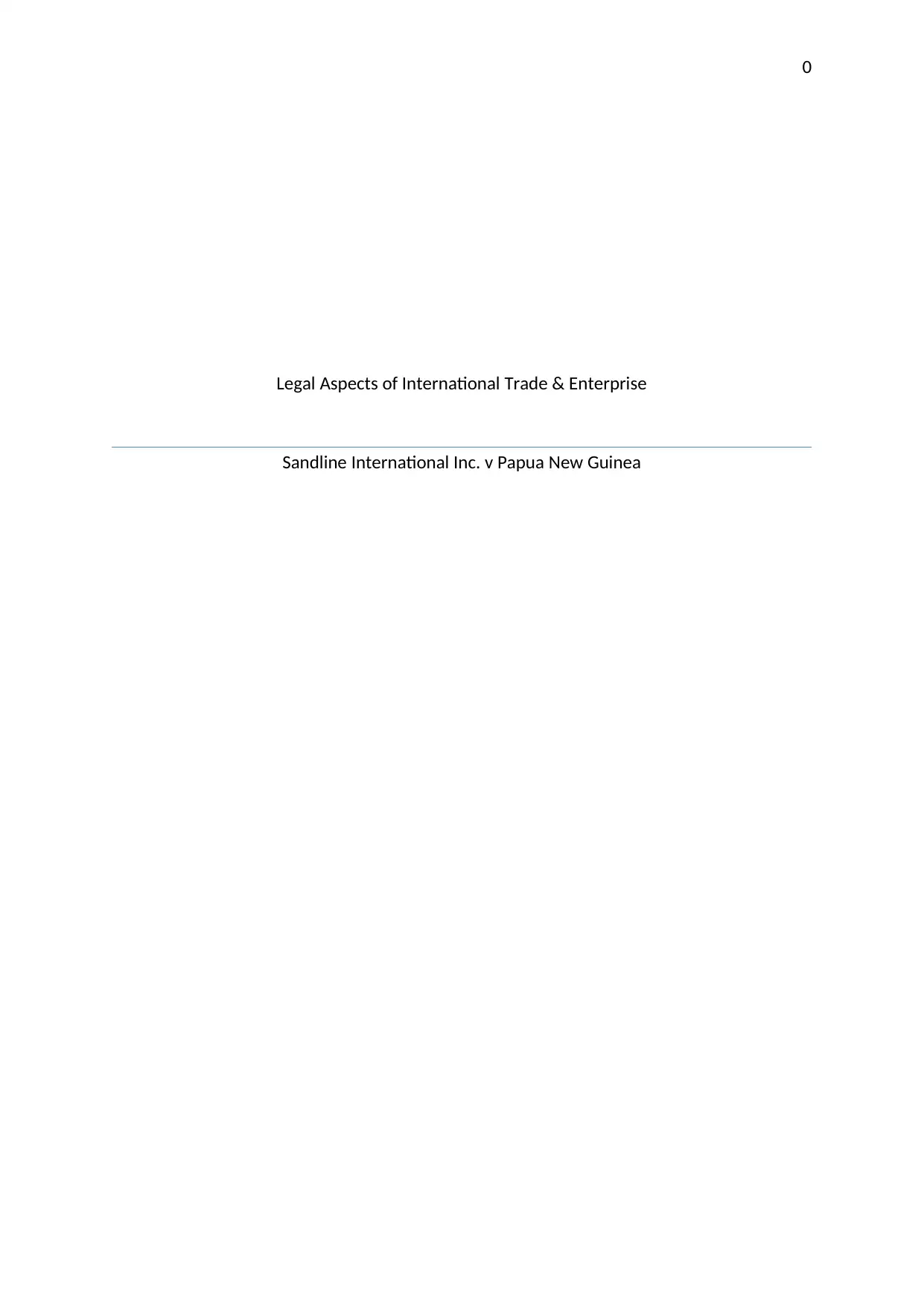
0
Legal Aspects of International Trade & Enterprise
Sandline International Inc. v Papua New Guinea
Legal Aspects of International Trade & Enterprise
Sandline International Inc. v Papua New Guinea
Paraphrase This Document
Need a fresh take? Get an instant paraphrase of this document with our AI Paraphraser
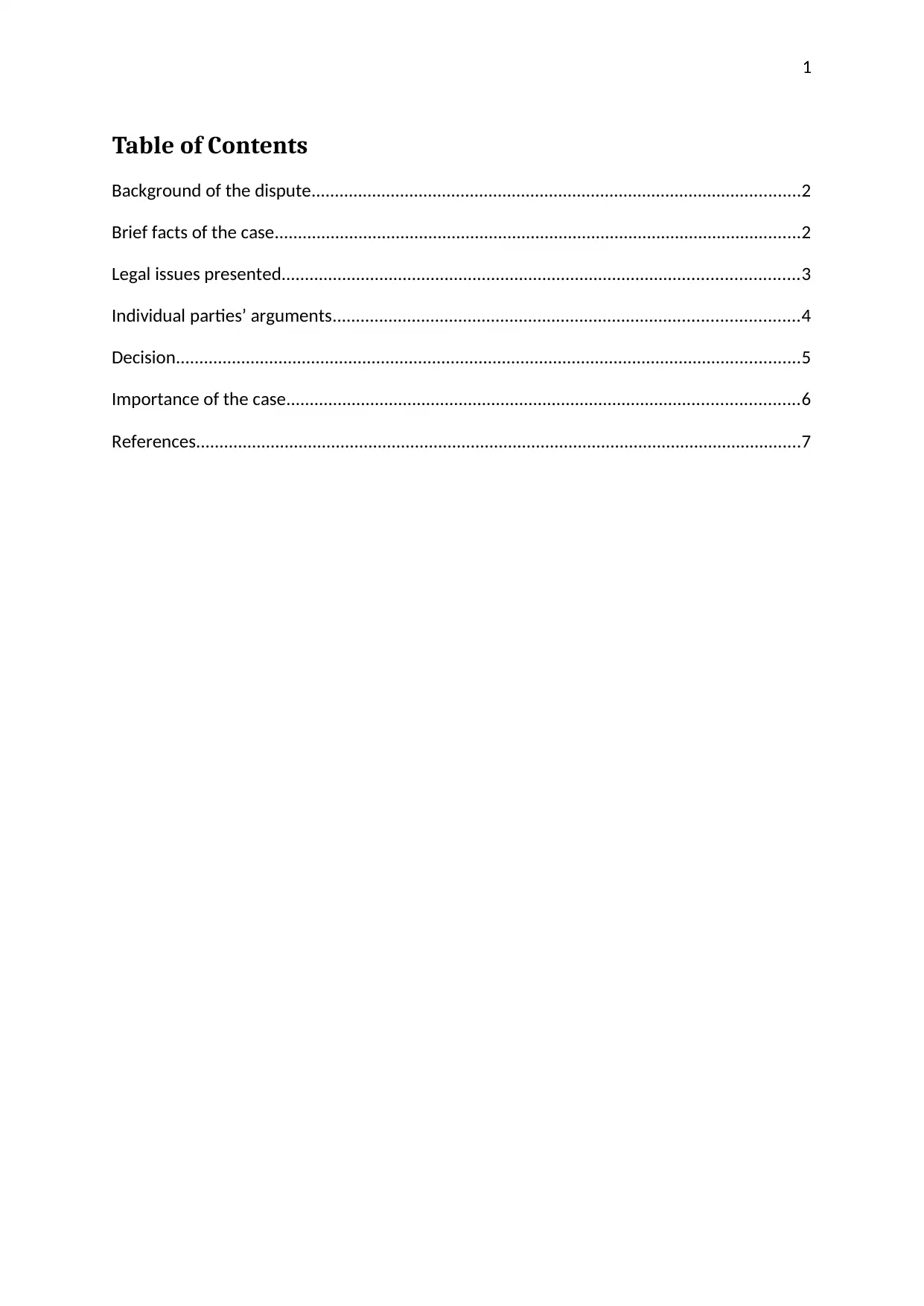
1
Table of Contents
Background of the dispute.........................................................................................................2
Brief facts of the case.................................................................................................................2
Legal issues presented...............................................................................................................3
Individual parties’ arguments....................................................................................................4
Decision......................................................................................................................................5
Importance of the case..............................................................................................................6
References..................................................................................................................................7
Table of Contents
Background of the dispute.........................................................................................................2
Brief facts of the case.................................................................................................................2
Legal issues presented...............................................................................................................3
Individual parties’ arguments....................................................................................................4
Decision......................................................................................................................................5
Importance of the case..............................................................................................................6
References..................................................................................................................................7
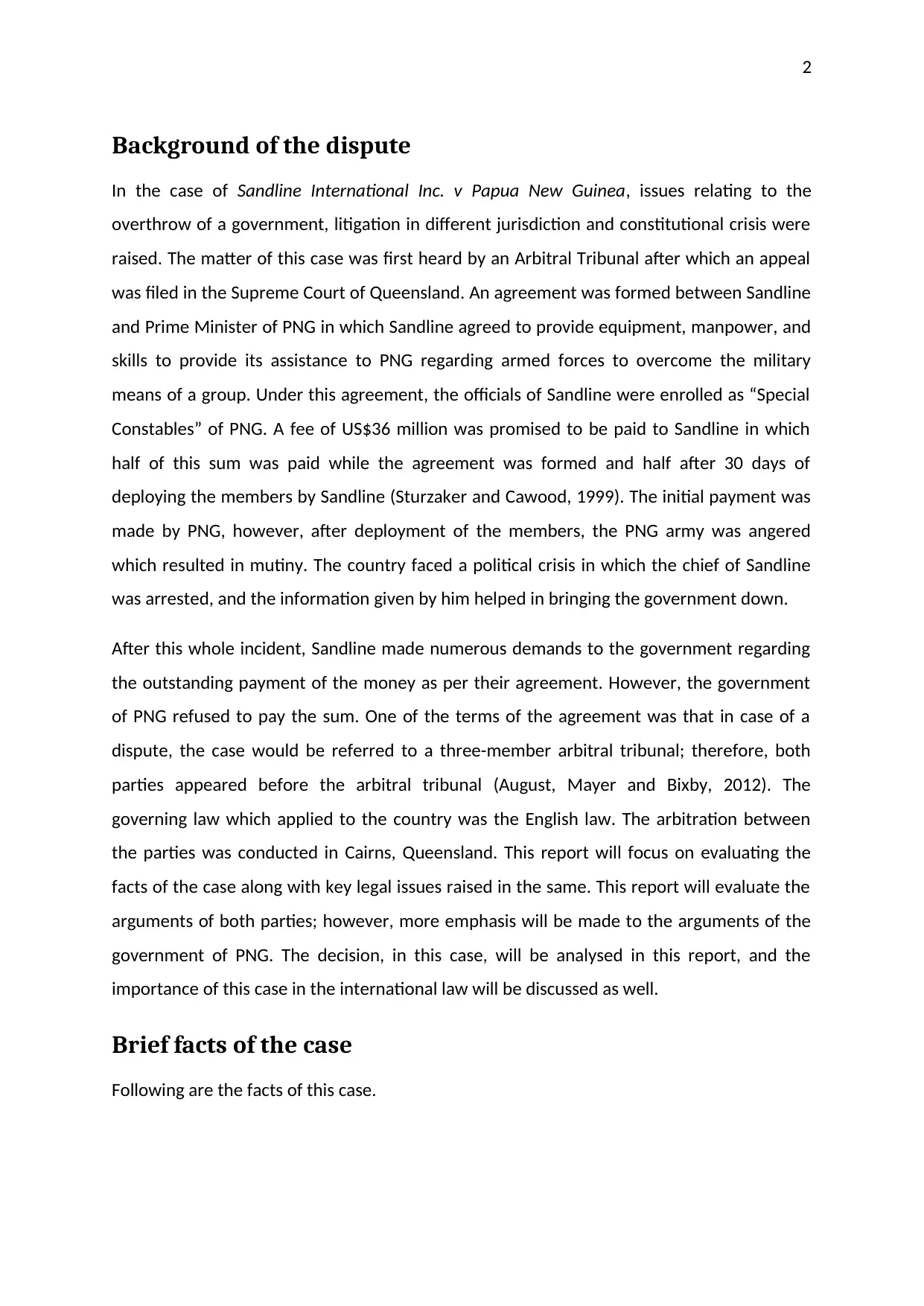
2
Background of the dispute
In the case of Sandline International Inc. v Papua New Guinea, issues relating to the
overthrow of a government, litigation in different jurisdiction and constitutional crisis were
raised. The matter of this case was first heard by an Arbitral Tribunal after which an appeal
was filed in the Supreme Court of Queensland. An agreement was formed between Sandline
and Prime Minister of PNG in which Sandline agreed to provide equipment, manpower, and
skills to provide its assistance to PNG regarding armed forces to overcome the military
means of a group. Under this agreement, the officials of Sandline were enrolled as “Special
Constables” of PNG. A fee of US$36 million was promised to be paid to Sandline in which
half of this sum was paid while the agreement was formed and half after 30 days of
deploying the members by Sandline (Sturzaker and Cawood, 1999). The initial payment was
made by PNG, however, after deployment of the members, the PNG army was angered
which resulted in mutiny. The country faced a political crisis in which the chief of Sandline
was arrested, and the information given by him helped in bringing the government down.
After this whole incident, Sandline made numerous demands to the government regarding
the outstanding payment of the money as per their agreement. However, the government
of PNG refused to pay the sum. One of the terms of the agreement was that in case of a
dispute, the case would be referred to a three-member arbitral tribunal; therefore, both
parties appeared before the arbitral tribunal (August, Mayer and Bixby, 2012). The
governing law which applied to the country was the English law. The arbitration between
the parties was conducted in Cairns, Queensland. This report will focus on evaluating the
facts of the case along with key legal issues raised in the same. This report will evaluate the
arguments of both parties; however, more emphasis will be made to the arguments of the
government of PNG. The decision, in this case, will be analysed in this report, and the
importance of this case in the international law will be discussed as well.
Brief facts of the case
Following are the facts of this case.
Background of the dispute
In the case of Sandline International Inc. v Papua New Guinea, issues relating to the
overthrow of a government, litigation in different jurisdiction and constitutional crisis were
raised. The matter of this case was first heard by an Arbitral Tribunal after which an appeal
was filed in the Supreme Court of Queensland. An agreement was formed between Sandline
and Prime Minister of PNG in which Sandline agreed to provide equipment, manpower, and
skills to provide its assistance to PNG regarding armed forces to overcome the military
means of a group. Under this agreement, the officials of Sandline were enrolled as “Special
Constables” of PNG. A fee of US$36 million was promised to be paid to Sandline in which
half of this sum was paid while the agreement was formed and half after 30 days of
deploying the members by Sandline (Sturzaker and Cawood, 1999). The initial payment was
made by PNG, however, after deployment of the members, the PNG army was angered
which resulted in mutiny. The country faced a political crisis in which the chief of Sandline
was arrested, and the information given by him helped in bringing the government down.
After this whole incident, Sandline made numerous demands to the government regarding
the outstanding payment of the money as per their agreement. However, the government
of PNG refused to pay the sum. One of the terms of the agreement was that in case of a
dispute, the case would be referred to a three-member arbitral tribunal; therefore, both
parties appeared before the arbitral tribunal (August, Mayer and Bixby, 2012). The
governing law which applied to the country was the English law. The arbitration between
the parties was conducted in Cairns, Queensland. This report will focus on evaluating the
facts of the case along with key legal issues raised in the same. This report will evaluate the
arguments of both parties; however, more emphasis will be made to the arguments of the
government of PNG. The decision, in this case, will be analysed in this report, and the
importance of this case in the international law will be discussed as well.
Brief facts of the case
Following are the facts of this case.
⊘ This is a preview!⊘
Do you want full access?
Subscribe today to unlock all pages.

Trusted by 1+ million students worldwide
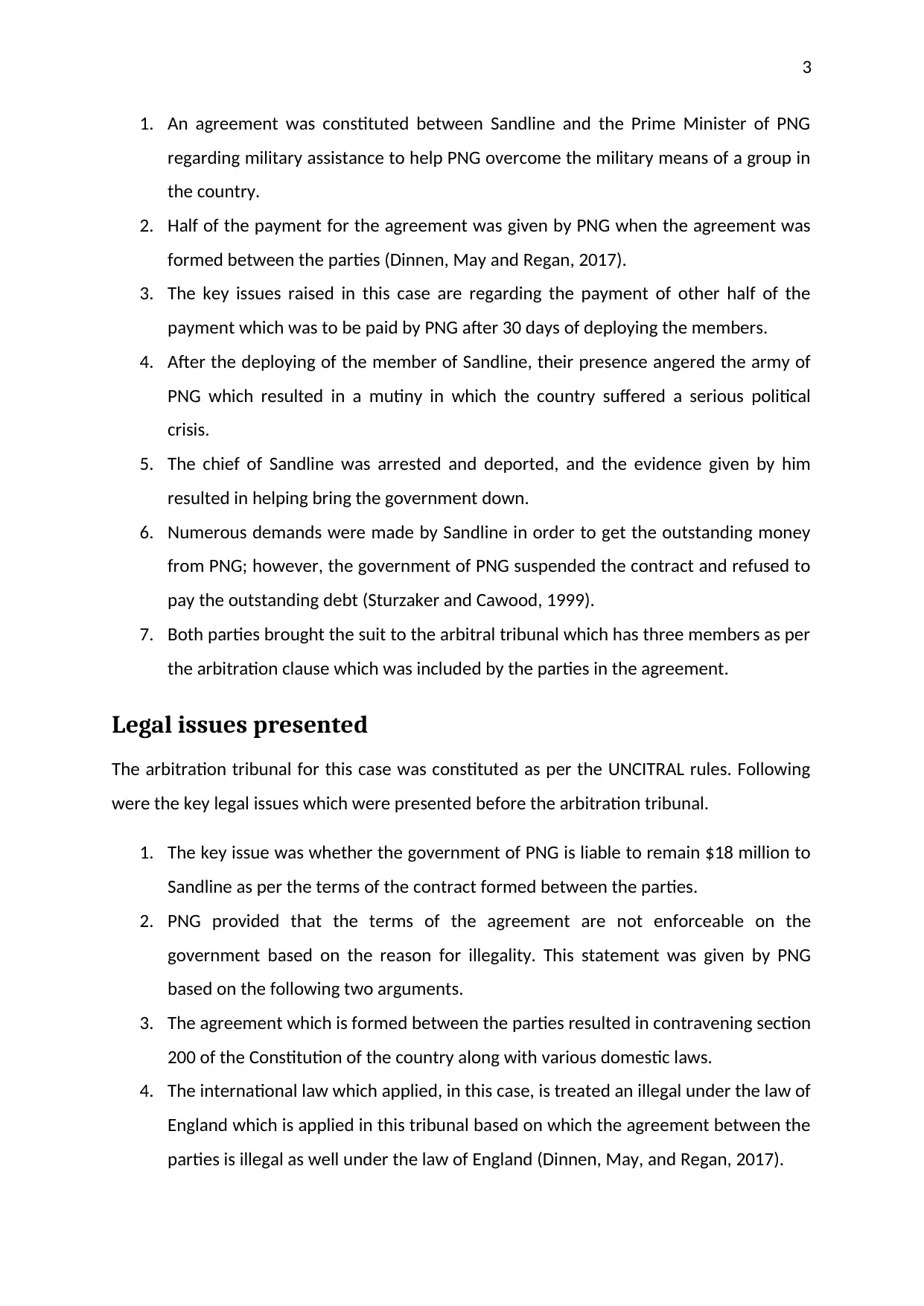
3
1. An agreement was constituted between Sandline and the Prime Minister of PNG
regarding military assistance to help PNG overcome the military means of a group in
the country.
2. Half of the payment for the agreement was given by PNG when the agreement was
formed between the parties (Dinnen, May and Regan, 2017).
3. The key issues raised in this case are regarding the payment of other half of the
payment which was to be paid by PNG after 30 days of deploying the members.
4. After the deploying of the member of Sandline, their presence angered the army of
PNG which resulted in a mutiny in which the country suffered a serious political
crisis.
5. The chief of Sandline was arrested and deported, and the evidence given by him
resulted in helping bring the government down.
6. Numerous demands were made by Sandline in order to get the outstanding money
from PNG; however, the government of PNG suspended the contract and refused to
pay the outstanding debt (Sturzaker and Cawood, 1999).
7. Both parties brought the suit to the arbitral tribunal which has three members as per
the arbitration clause which was included by the parties in the agreement.
Legal issues presented
The arbitration tribunal for this case was constituted as per the UNCITRAL rules. Following
were the key legal issues which were presented before the arbitration tribunal.
1. The key issue was whether the government of PNG is liable to remain $18 million to
Sandline as per the terms of the contract formed between the parties.
2. PNG provided that the terms of the agreement are not enforceable on the
government based on the reason for illegality. This statement was given by PNG
based on the following two arguments.
3. The agreement which is formed between the parties resulted in contravening section
200 of the Constitution of the country along with various domestic laws.
4. The international law which applied, in this case, is treated an illegal under the law of
England which is applied in this tribunal based on which the agreement between the
parties is illegal as well under the law of England (Dinnen, May, and Regan, 2017).
1. An agreement was constituted between Sandline and the Prime Minister of PNG
regarding military assistance to help PNG overcome the military means of a group in
the country.
2. Half of the payment for the agreement was given by PNG when the agreement was
formed between the parties (Dinnen, May and Regan, 2017).
3. The key issues raised in this case are regarding the payment of other half of the
payment which was to be paid by PNG after 30 days of deploying the members.
4. After the deploying of the member of Sandline, their presence angered the army of
PNG which resulted in a mutiny in which the country suffered a serious political
crisis.
5. The chief of Sandline was arrested and deported, and the evidence given by him
resulted in helping bring the government down.
6. Numerous demands were made by Sandline in order to get the outstanding money
from PNG; however, the government of PNG suspended the contract and refused to
pay the outstanding debt (Sturzaker and Cawood, 1999).
7. Both parties brought the suit to the arbitral tribunal which has three members as per
the arbitration clause which was included by the parties in the agreement.
Legal issues presented
The arbitration tribunal for this case was constituted as per the UNCITRAL rules. Following
were the key legal issues which were presented before the arbitration tribunal.
1. The key issue was whether the government of PNG is liable to remain $18 million to
Sandline as per the terms of the contract formed between the parties.
2. PNG provided that the terms of the agreement are not enforceable on the
government based on the reason for illegality. This statement was given by PNG
based on the following two arguments.
3. The agreement which is formed between the parties resulted in contravening section
200 of the Constitution of the country along with various domestic laws.
4. The international law which applied, in this case, is treated an illegal under the law of
England which is applied in this tribunal based on which the agreement between the
parties is illegal as well under the law of England (Dinnen, May, and Regan, 2017).
Paraphrase This Document
Need a fresh take? Get an instant paraphrase of this document with our AI Paraphraser
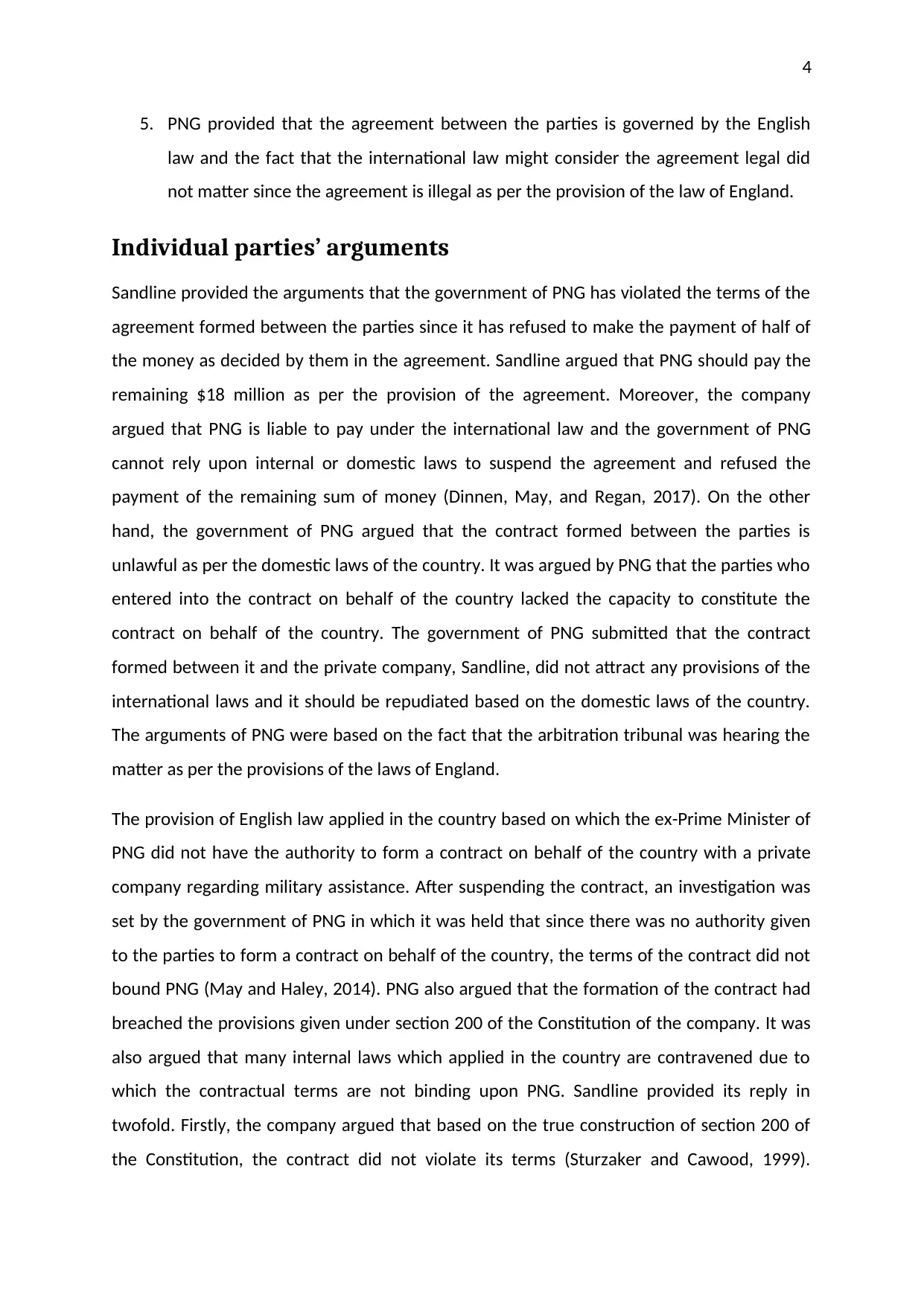
4
5. PNG provided that the agreement between the parties is governed by the English
law and the fact that the international law might consider the agreement legal did
not matter since the agreement is illegal as per the provision of the law of England.
Individual parties’ arguments
Sandline provided the arguments that the government of PNG has violated the terms of the
agreement formed between the parties since it has refused to make the payment of half of
the money as decided by them in the agreement. Sandline argued that PNG should pay the
remaining $18 million as per the provision of the agreement. Moreover, the company
argued that PNG is liable to pay under the international law and the government of PNG
cannot rely upon internal or domestic laws to suspend the agreement and refused the
payment of the remaining sum of money (Dinnen, May, and Regan, 2017). On the other
hand, the government of PNG argued that the contract formed between the parties is
unlawful as per the domestic laws of the country. It was argued by PNG that the parties who
entered into the contract on behalf of the country lacked the capacity to constitute the
contract on behalf of the country. The government of PNG submitted that the contract
formed between it and the private company, Sandline, did not attract any provisions of the
international laws and it should be repudiated based on the domestic laws of the country.
The arguments of PNG were based on the fact that the arbitration tribunal was hearing the
matter as per the provisions of the laws of England.
The provision of English law applied in the country based on which the ex-Prime Minister of
PNG did not have the authority to form a contract on behalf of the country with a private
company regarding military assistance. After suspending the contract, an investigation was
set by the government of PNG in which it was held that since there was no authority given
to the parties to form a contract on behalf of the country, the terms of the contract did not
bound PNG (May and Haley, 2014). PNG also argued that the formation of the contract had
breached the provisions given under section 200 of the Constitution of the company. It was
also argued that many internal laws which applied in the country are contravened due to
which the contractual terms are not binding upon PNG. Sandline provided its reply in
twofold. Firstly, the company argued that based on the true construction of section 200 of
the Constitution, the contract did not violate its terms (Sturzaker and Cawood, 1999).
5. PNG provided that the agreement between the parties is governed by the English
law and the fact that the international law might consider the agreement legal did
not matter since the agreement is illegal as per the provision of the law of England.
Individual parties’ arguments
Sandline provided the arguments that the government of PNG has violated the terms of the
agreement formed between the parties since it has refused to make the payment of half of
the money as decided by them in the agreement. Sandline argued that PNG should pay the
remaining $18 million as per the provision of the agreement. Moreover, the company
argued that PNG is liable to pay under the international law and the government of PNG
cannot rely upon internal or domestic laws to suspend the agreement and refused the
payment of the remaining sum of money (Dinnen, May, and Regan, 2017). On the other
hand, the government of PNG argued that the contract formed between the parties is
unlawful as per the domestic laws of the country. It was argued by PNG that the parties who
entered into the contract on behalf of the country lacked the capacity to constitute the
contract on behalf of the country. The government of PNG submitted that the contract
formed between it and the private company, Sandline, did not attract any provisions of the
international laws and it should be repudiated based on the domestic laws of the country.
The arguments of PNG were based on the fact that the arbitration tribunal was hearing the
matter as per the provisions of the laws of England.
The provision of English law applied in the country based on which the ex-Prime Minister of
PNG did not have the authority to form a contract on behalf of the country with a private
company regarding military assistance. After suspending the contract, an investigation was
set by the government of PNG in which it was held that since there was no authority given
to the parties to form a contract on behalf of the country, the terms of the contract did not
bound PNG (May and Haley, 2014). PNG also argued that the formation of the contract had
breached the provisions given under section 200 of the Constitution of the company. It was
also argued that many internal laws which applied in the country are contravened due to
which the contractual terms are not binding upon PNG. Sandline provided its reply in
twofold. Firstly, the company argued that based on the true construction of section 200 of
the Constitution, the contract did not violate its terms (Sturzaker and Cawood, 1999).
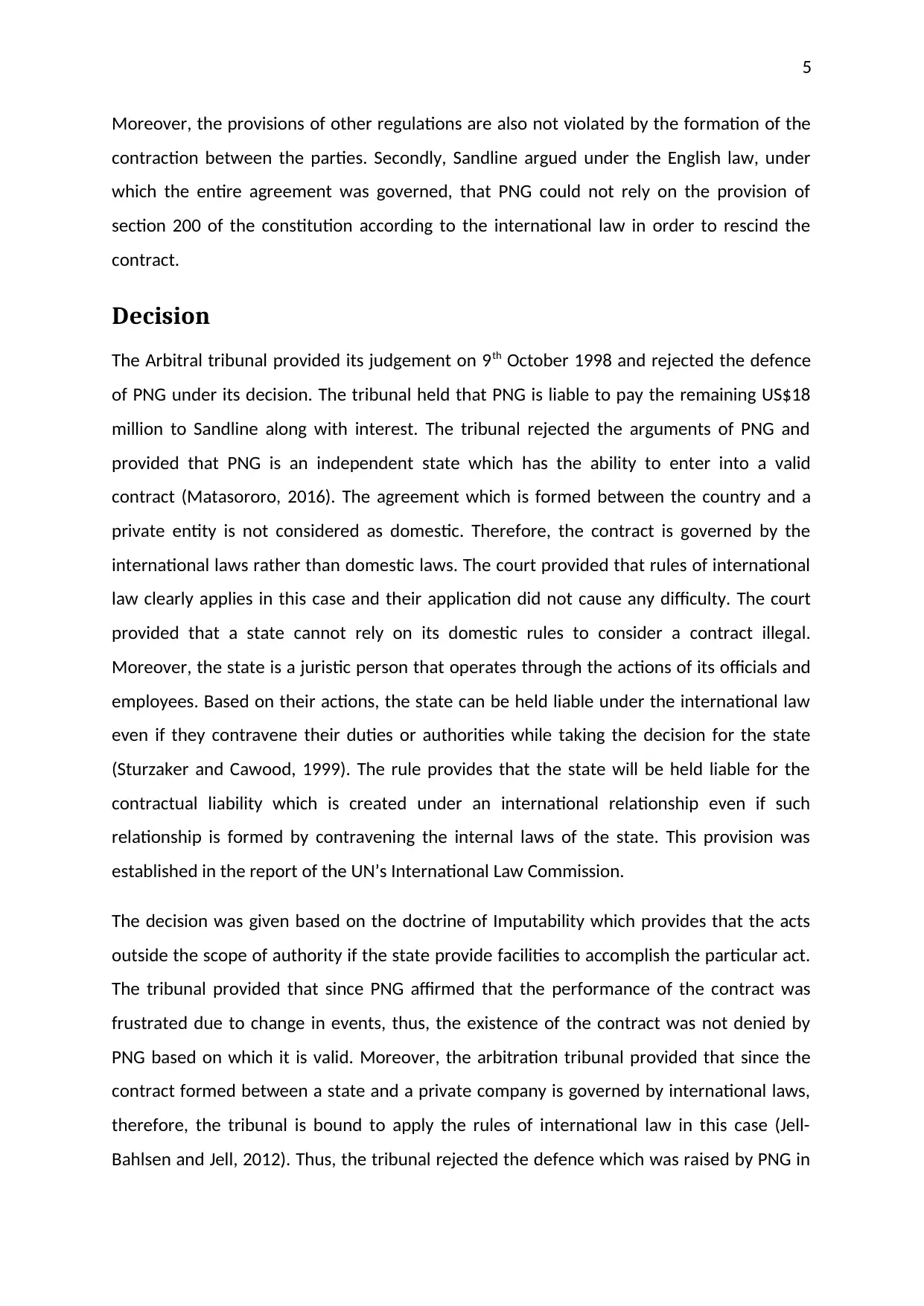
5
Moreover, the provisions of other regulations are also not violated by the formation of the
contraction between the parties. Secondly, Sandline argued under the English law, under
which the entire agreement was governed, that PNG could not rely on the provision of
section 200 of the constitution according to the international law in order to rescind the
contract.
Decision
The Arbitral tribunal provided its judgement on 9th October 1998 and rejected the defence
of PNG under its decision. The tribunal held that PNG is liable to pay the remaining US$18
million to Sandline along with interest. The tribunal rejected the arguments of PNG and
provided that PNG is an independent state which has the ability to enter into a valid
contract (Matasororo, 2016). The agreement which is formed between the country and a
private entity is not considered as domestic. Therefore, the contract is governed by the
international laws rather than domestic laws. The court provided that rules of international
law clearly applies in this case and their application did not cause any difficulty. The court
provided that a state cannot rely on its domestic rules to consider a contract illegal.
Moreover, the state is a juristic person that operates through the actions of its officials and
employees. Based on their actions, the state can be held liable under the international law
even if they contravene their duties or authorities while taking the decision for the state
(Sturzaker and Cawood, 1999). The rule provides that the state will be held liable for the
contractual liability which is created under an international relationship even if such
relationship is formed by contravening the internal laws of the state. This provision was
established in the report of the UN’s International Law Commission.
The decision was given based on the doctrine of Imputability which provides that the acts
outside the scope of authority if the state provide facilities to accomplish the particular act.
The tribunal provided that since PNG affirmed that the performance of the contract was
frustrated due to change in events, thus, the existence of the contract was not denied by
PNG based on which it is valid. Moreover, the arbitration tribunal provided that since the
contract formed between a state and a private company is governed by international laws,
therefore, the tribunal is bound to apply the rules of international law in this case (Jell-
Bahlsen and Jell, 2012). Thus, the tribunal rejected the defence which was raised by PNG in
Moreover, the provisions of other regulations are also not violated by the formation of the
contraction between the parties. Secondly, Sandline argued under the English law, under
which the entire agreement was governed, that PNG could not rely on the provision of
section 200 of the constitution according to the international law in order to rescind the
contract.
Decision
The Arbitral tribunal provided its judgement on 9th October 1998 and rejected the defence
of PNG under its decision. The tribunal held that PNG is liable to pay the remaining US$18
million to Sandline along with interest. The tribunal rejected the arguments of PNG and
provided that PNG is an independent state which has the ability to enter into a valid
contract (Matasororo, 2016). The agreement which is formed between the country and a
private entity is not considered as domestic. Therefore, the contract is governed by the
international laws rather than domestic laws. The court provided that rules of international
law clearly applies in this case and their application did not cause any difficulty. The court
provided that a state cannot rely on its domestic rules to consider a contract illegal.
Moreover, the state is a juristic person that operates through the actions of its officials and
employees. Based on their actions, the state can be held liable under the international law
even if they contravene their duties or authorities while taking the decision for the state
(Sturzaker and Cawood, 1999). The rule provides that the state will be held liable for the
contractual liability which is created under an international relationship even if such
relationship is formed by contravening the internal laws of the state. This provision was
established in the report of the UN’s International Law Commission.
The decision was given based on the doctrine of Imputability which provides that the acts
outside the scope of authority if the state provide facilities to accomplish the particular act.
The tribunal provided that since PNG affirmed that the performance of the contract was
frustrated due to change in events, thus, the existence of the contract was not denied by
PNG based on which it is valid. Moreover, the arbitration tribunal provided that since the
contract formed between a state and a private company is governed by international laws,
therefore, the tribunal is bound to apply the rules of international law in this case (Jell-
Bahlsen and Jell, 2012). Thus, the tribunal rejected the defence which was raised by PNG in
⊘ This is a preview!⊘
Do you want full access?
Subscribe today to unlock all pages.

Trusted by 1+ million students worldwide
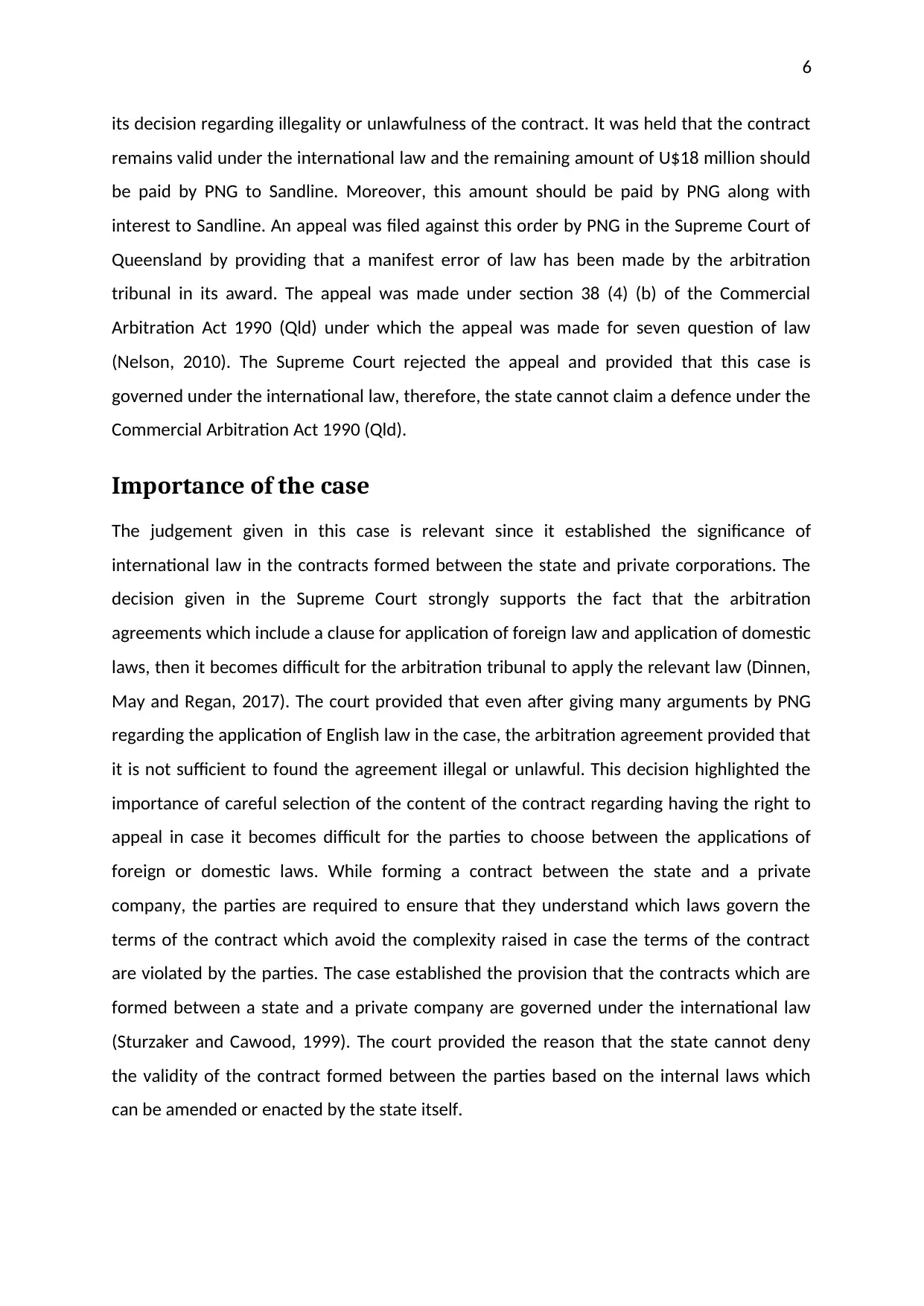
6
its decision regarding illegality or unlawfulness of the contract. It was held that the contract
remains valid under the international law and the remaining amount of U$18 million should
be paid by PNG to Sandline. Moreover, this amount should be paid by PNG along with
interest to Sandline. An appeal was filed against this order by PNG in the Supreme Court of
Queensland by providing that a manifest error of law has been made by the arbitration
tribunal in its award. The appeal was made under section 38 (4) (b) of the Commercial
Arbitration Act 1990 (Qld) under which the appeal was made for seven question of law
(Nelson, 2010). The Supreme Court rejected the appeal and provided that this case is
governed under the international law, therefore, the state cannot claim a defence under the
Commercial Arbitration Act 1990 (Qld).
Importance of the case
The judgement given in this case is relevant since it established the significance of
international law in the contracts formed between the state and private corporations. The
decision given in the Supreme Court strongly supports the fact that the arbitration
agreements which include a clause for application of foreign law and application of domestic
laws, then it becomes difficult for the arbitration tribunal to apply the relevant law (Dinnen,
May and Regan, 2017). The court provided that even after giving many arguments by PNG
regarding the application of English law in the case, the arbitration agreement provided that
it is not sufficient to found the agreement illegal or unlawful. This decision highlighted the
importance of careful selection of the content of the contract regarding having the right to
appeal in case it becomes difficult for the parties to choose between the applications of
foreign or domestic laws. While forming a contract between the state and a private
company, the parties are required to ensure that they understand which laws govern the
terms of the contract which avoid the complexity raised in case the terms of the contract
are violated by the parties. The case established the provision that the contracts which are
formed between a state and a private company are governed under the international law
(Sturzaker and Cawood, 1999). The court provided the reason that the state cannot deny
the validity of the contract formed between the parties based on the internal laws which
can be amended or enacted by the state itself.
its decision regarding illegality or unlawfulness of the contract. It was held that the contract
remains valid under the international law and the remaining amount of U$18 million should
be paid by PNG to Sandline. Moreover, this amount should be paid by PNG along with
interest to Sandline. An appeal was filed against this order by PNG in the Supreme Court of
Queensland by providing that a manifest error of law has been made by the arbitration
tribunal in its award. The appeal was made under section 38 (4) (b) of the Commercial
Arbitration Act 1990 (Qld) under which the appeal was made for seven question of law
(Nelson, 2010). The Supreme Court rejected the appeal and provided that this case is
governed under the international law, therefore, the state cannot claim a defence under the
Commercial Arbitration Act 1990 (Qld).
Importance of the case
The judgement given in this case is relevant since it established the significance of
international law in the contracts formed between the state and private corporations. The
decision given in the Supreme Court strongly supports the fact that the arbitration
agreements which include a clause for application of foreign law and application of domestic
laws, then it becomes difficult for the arbitration tribunal to apply the relevant law (Dinnen,
May and Regan, 2017). The court provided that even after giving many arguments by PNG
regarding the application of English law in the case, the arbitration agreement provided that
it is not sufficient to found the agreement illegal or unlawful. This decision highlighted the
importance of careful selection of the content of the contract regarding having the right to
appeal in case it becomes difficult for the parties to choose between the applications of
foreign or domestic laws. While forming a contract between the state and a private
company, the parties are required to ensure that they understand which laws govern the
terms of the contract which avoid the complexity raised in case the terms of the contract
are violated by the parties. The case established the provision that the contracts which are
formed between a state and a private company are governed under the international law
(Sturzaker and Cawood, 1999). The court provided the reason that the state cannot deny
the validity of the contract formed between the parties based on the internal laws which
can be amended or enacted by the state itself.
Paraphrase This Document
Need a fresh take? Get an instant paraphrase of this document with our AI Paraphraser
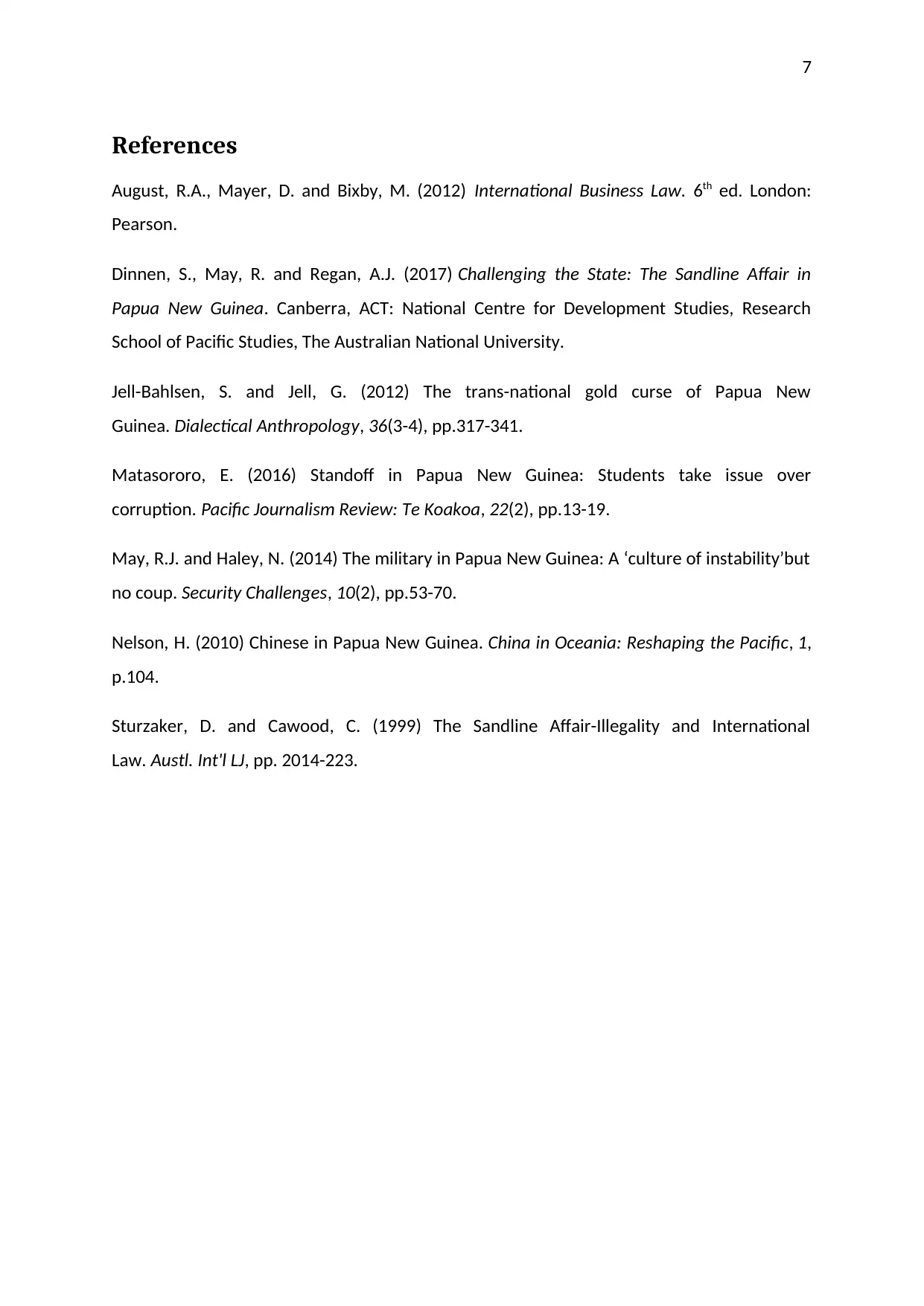
7
References
August, R.A., Mayer, D. and Bixby, M. (2012) International Business Law. 6th ed. London:
Pearson.
Dinnen, S., May, R. and Regan, A.J. (2017) Challenging the State: The Sandline Affair in
Papua New Guinea. Canberra, ACT: National Centre for Development Studies, Research
School of Pacific Studies, The Australian National University.
Jell-Bahlsen, S. and Jell, G. (2012) The trans-national gold curse of Papua New
Guinea. Dialectical Anthropology, 36(3-4), pp.317-341.
Matasororo, E. (2016) Standoff in Papua New Guinea: Students take issue over
corruption. Pacific Journalism Review: Te Koakoa, 22(2), pp.13-19.
May, R.J. and Haley, N. (2014) The military in Papua New Guinea: A ‘culture of instability’but
no coup. Security Challenges, 10(2), pp.53-70.
Nelson, H. (2010) Chinese in Papua New Guinea. China in Oceania: Reshaping the Pacific, 1,
p.104.
Sturzaker, D. and Cawood, C. (1999) The Sandline Affair-Illegality and International
Law. Austl. Int'l LJ, pp. 2014-223.
References
August, R.A., Mayer, D. and Bixby, M. (2012) International Business Law. 6th ed. London:
Pearson.
Dinnen, S., May, R. and Regan, A.J. (2017) Challenging the State: The Sandline Affair in
Papua New Guinea. Canberra, ACT: National Centre for Development Studies, Research
School of Pacific Studies, The Australian National University.
Jell-Bahlsen, S. and Jell, G. (2012) The trans-national gold curse of Papua New
Guinea. Dialectical Anthropology, 36(3-4), pp.317-341.
Matasororo, E. (2016) Standoff in Papua New Guinea: Students take issue over
corruption. Pacific Journalism Review: Te Koakoa, 22(2), pp.13-19.
May, R.J. and Haley, N. (2014) The military in Papua New Guinea: A ‘culture of instability’but
no coup. Security Challenges, 10(2), pp.53-70.
Nelson, H. (2010) Chinese in Papua New Guinea. China in Oceania: Reshaping the Pacific, 1,
p.104.
Sturzaker, D. and Cawood, C. (1999) The Sandline Affair-Illegality and International
Law. Austl. Int'l LJ, pp. 2014-223.
1 out of 8
Your All-in-One AI-Powered Toolkit for Academic Success.
+13062052269
info@desklib.com
Available 24*7 on WhatsApp / Email
![[object Object]](/_next/static/media/star-bottom.7253800d.svg)
Unlock your academic potential
Copyright © 2020–2026 A2Z Services. All Rights Reserved. Developed and managed by ZUCOL.